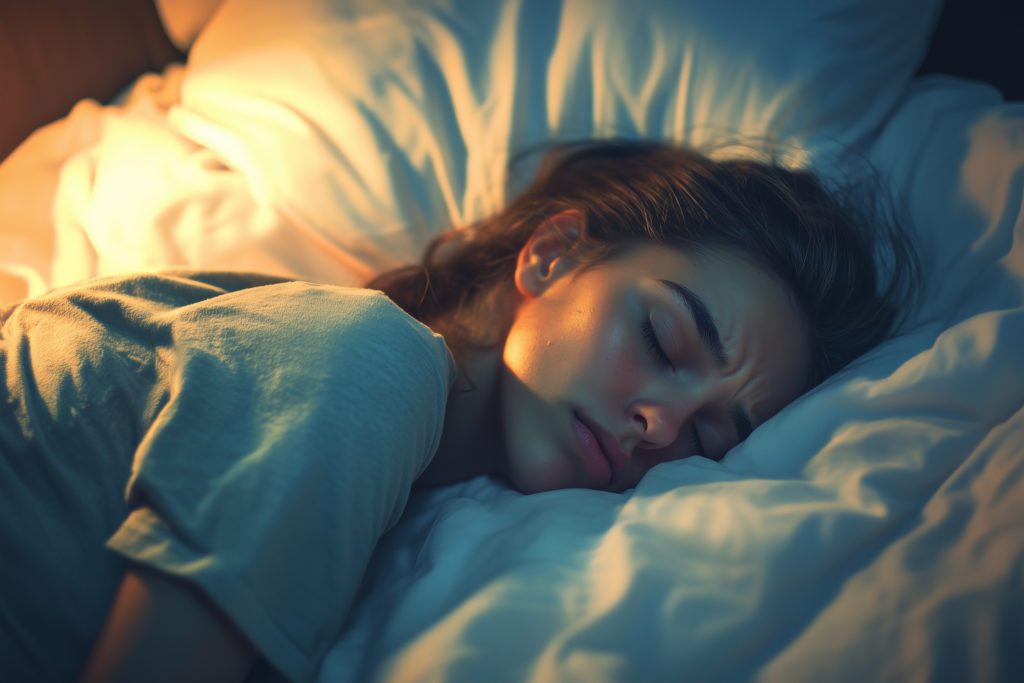
Understanding Deep Sleep and Its Importance in the Sleep Cycle
During deep sleep, your brain waves slow down and are characterized by Delta waves. Deep sleep is essential for body and brain functioning.

Every night, your body goes through four stages of sleep. These stages repeat about four times throughout the night. Deep sleep, which is when your brain waves slow down, occurs during stage 3 of sleep. Although all of the stages of sleep are important, deep sleep is especially critical because it is linked to a number of important functions, including immune system regulation, hormones, memory, and more.
When Does Deep Sleep Occur in the Sleep Cycle?
Deep sleep occurs during NREM stage 3 of the sleep cycle. During this stage of sleep, your heart rate and breathing slow down and your muscles relax. This stage lasts for approximately 45 to 90 minutes. You spend more time at the beginning of the night in a deep sleep.
Deep sleep is also referred to as “Delta sleep” or “Deep wave sleep.” That’s because brain activity during this period is characterized by a pattern known as Delta waves. It’s difficult to wake up from a deep sleep, even by loud noises. If you are awoken from a deep sleep, you may feel foggy after waking up.
Why is Deep Sleep Important?
Deep sleep is the most restorative stage of sleep. It’s what helps you feel refreshed in the morning. It also plays a vital role in brain and body functioning. It helps:
- Hormones - Key hormones are released during deep sleep that help regulate your body’s systems.
- Heart health - Deep sleep is especially beneficial to the cardiovascular system. It enables the left ventricle to pump oxygen-rich blood into the circulatory system more efficiently.
- Immune system - Deep sleep helps strengthen your immune system. This makes you better able to fight off infections.
- Metabolism - If you don’t get enough deep sleep it can hamper your metabolism and lead to weight gain.
- Muscle and tissue repair - Your body’s muscles and tissues are repaired during deep sleep.
- Remove waste from the brain - During deep sleep, waste products are removed from the cerebrospinal fluid.
How Much Deep Sleep Do You Need?
About 25 percent of the time that you spend asleep is typically spent in a deep sleep. So, if you sleep eight hours a night, you will spend approximately two hours a night in deep sleep. As you age, deep sleep declines, so a person over the age of 65 may get half an hour or less of deep sleep a night.
You can get an overview of how much deep sleep you get with Pillow. The app allows you to track your sleep and get an analysis of how much time you spend in each stage.
What Happens When You Don’t Get Enough Deep Sleep?
If you don’t get enough deep sleep, it can interfere with the release of hormones. It can also impact immune system functioning. Long-term, not getting enough deep sleep is linked with the following conditions:
- Stroke - Stroke is related to a lack of deep sleep.
- Heart disease - There is a strong link between heart disease and deep sleep.
- Diabetes - Research has shown that a lack of deep sleep can increase a person’s risk of diabetes.
- Alzheimer's disease - Deep sleep has been found to clear the brain of toxins associated with this form of dementia.
What Can Impact Deep Sleep?
A variety of factors can affect deep sleep, including environmental factors and mental stress. Some sleep disorders are also related to deep sleep. These parasomnias can keep you from getting enough deep wave sleep:
- Night terrors
- Sleepwalking
- Sleep-related eating disorder (SRED)
- Bedwetting
In addition, obstructive sleep apnea and circadian rhythm disorders can negatively impact deep sleep. Certain medications, especially benzodiazepines like Valium and Ativan can interfere with deep sleep. They reduce the amount of time a person spends in Delta sleep.
Signs You’re Not Getting Enough Deep Sleep
Deep sleep is essential to how we function. If you aren’t getting enough deep sleep, you won’t feel great in the morning. You’ll likely wake up feeling unrefreshed and irritable. Here are some other signs:
- You get seven to nine hours of sleep a night but wake up feeling exhausted
- You have difficulty concentrating and focusing during the day
- You feel too tired to carry out daily activities
Tips to Get More Deep Sleep
To get enough deep sleep, make sure you are getting enough overall sleep — seven to nine hours in total each night. Also, follow researched-backed tips for healthy sleep, such as:
- Manage anxiety - Anxiety can interfere with sleep. Anxiety has a negative impact on the quality of sleep.
- Listen to pink noise - Pink noise is constant background or ambient noise, such as rain sounds. A study published in Frontiers in Human Neuroscience found that pink noise can enhance deep sleep.
- Take a warm bath before bed - A warm shower or bath about an hour or two before bed can help you sleep better, according to research.
- Treat sleep disorders - If you have a sleep disorder like obstructive sleep apnea (OSA), make sure you treat it. Treating sleep disorders can help you get more deep sleep.
- Reduce alcohol use - Drinking alcohol before bed has been found to interfere with sleep. It specifically is associated with less slow-wave sleep.
- Exercise - Moderate aerobic exercise has been shown to increase the quality of deep-wave sleep that you get. Therefore, get at least 30 minutes of moderate to intense exercise a day, but make sure you work out earlier in the day as working out too late in the day can interfere with sleep.
When to See a Doctor
If you wake up feeling unrefreshed or have difficulty staying awake during the day, it’s a good idea to see a sleep specialist. If your sleep doctor believes there could be disturbances in your deep sleep, they may order a sleep study or polysomnography (PSG). This test measures your brain waves, breathing rate, heart rate, and more.
Your doctor can use information from a sleep study to learn whether or not you’re getting enough deep sleep throughout the night. This information can also be used to determine if you have a sleep disorder that is affecting your deep sleep.
Deep Sleep: The Key to a Good Night’s Sleep
Deep sleep, also called delta sleep, is essential for optimal functioning. It supports metabolism, muscle repair, and your immune system. There are various things that you can do to get better deep sleep, including treating sleep disorders, exercising on a regular basis and reducing alcohol use.
FAQ
How long does deep sleep typically last?
Deep sleep occurs during stage 3 of non-rapid eye movement (NREM) sleep and constitutes about 25% of total sleep. In an 8-hour sleep cycle, this equals roughly 2 hours. However, deep sleep declines with age—individuals over 65 may experience only 30 minutes or less of deep sleep per night.
Does spending a lot of time in deep sleep equate to being a heavy sleeper?
Spending more time in deep sleep doesn’t necessarily mean being a heavy sleeper. Deep sleep is a restorative stage where it’s harder to wake up, but heavy sleepers may also be less responsive during lighter sleep stages. Factors like genetics, lifestyle, and sleep hygiene influence both deep sleep duration and how easily someone wakes up.
How does deep sleep change with age?
The amount of deep sleep decreases as people age. Younger individuals may spend up to 2 hours in deep sleep, while older adults often experience significantly less. This decline affects physical restoration and may contribute to poorer health outcomes, including weakened immune function and cognitive issues.
Can lifestyle modifications enhance deep sleep?
Yes, lifestyle changes can improve deep sleep quality. Following a regular sleep schedule, maintaining a cool and dark sleep environment, reducing screen time before bed, and engaging in regular exercise help promote deeper sleep. Avoiding caffeine and alcohol close to bedtime is also beneficial.
Is deep sleep more important than light sleep?
Both deep and light sleep are vital for health. Deep sleep supports physical recovery, immune function, and hormonal balance, while light sleep facilitates memory consolidation, cognitive processing, and preparation for deeper stages. Each sleep stage is essential for feeling rested and refreshed.
What is the relationship between deep sleep and memory consolidation?
During deep sleep, the brain consolidates and processes memories. This stage strengthens neural connections related to learning and integrates information acquired throughout the day, enhancing long-term memory and cognitive performance. Without sufficient deep sleep, memory retention may suffer.
Do sleep disorders affect deep sleep?
Yes, sleep disorders such as obstructive sleep apnea, restless leg syndrome, and sleepwalking can significantly reduce deep sleep quality. These conditions interrupt the sleep cycle, preventing the brain from fully entering or maintaining deep sleep, which can lead to health and cognitive issues.
Are there any health risks associated with insufficient deep sleep?
A lack of deep sleep is associated with weakened immunity, increased risk of cardiovascular disease, obesity, and cognitive decline. Over time, insufficient deep sleep can impair the body’s ability to recover, regulate hormones, and support mental health, leading to long-term health complications.

Written by
Emily Mendez
Emily Mendez is a former therapist and mental health author. She is one of the leading voices in mental health. Emily's writing has appeared in eCounseling, SonderMind, and more. Emily is frequently interviewed by Healthline, Fatherly, INSIDER, Family Circle, and other national media for her advice and expert opinion on the latest mental health topics.
Download Pillow
Get help
Press & News
Legal
Connect
X (Twitter)
Company
Copyright © Neybox Digital Ltd.



